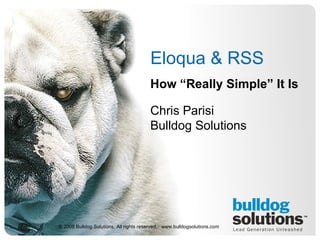RSS Bulldog Solutions 07142008
- 1. Eloqua & RSS How “Really Simple” It Is Chris Parisi Bulldog Solutions © 2008 Bulldog Solutions. All rights reserved. www.bulldogsolutions.com
- 2. What Is RSS? Content Syndication via Web feeds (XML) Web content Blogs News/Newsletters Podcasts History 1999 - RDF Site Summary (RSS 0.9) 2000 – Rich Site Summary (RSS 1.0) 2002 - Really Simple Syndication (RSS 2.0) Eloqua RSS Released in Spring 2008 Adds the ability to track content consumption that was previously anonymous * Available in Eloqua Team or as add-on to Express July 2008 www.bulldogsolutions.com
- 3. Content Lifecycle July 2008 www.bulldogsolutions.com
- 4. Content Creation, Customization and Aggregation July 2008 www.bulldogsolutions.com
- 5. Content Source: External Aggregation (via Yahoo Pipes ) July 2008 www.bulldogsolutions.com
- 6. Content Source: Custom News Feeds (via Google Alerts ) July 2008 www.bulldogsolutions.com
- 7. Content Source: Original Content ( via Eloqua ) July 2008 www.bulldogsolutions.com
- 8. Content Distribution & Publishing July 2008 www.bulldogsolutions.com
- 9. Web Publishing: Eloqua Hypersite July 2008 www.bulldogsolutions.com Although this is not dynamic content, it does provide a customized feel Offer separate feeds for a few different subjects of interest to your audience Let them choose which feeds they’d like to subscribe to
- 10. Web Publishing: Eloqua PURL July 2008 www.bulldogsolutions.com The most customized experience is offered via personalized URL (PURL) Using content substitutions, you can serve up different feeds based on the interests of your known visitors
- 11. E-mail Publishing July 2008 www.bulldogsolutions.com RSS feeds can be embedded and delivered via e-mail 2 ways: Directly inserting a feed into an email allows you to choose the number of items to feed posts to insert or only show posts published in a certain time frame. Using Activity Driven Content (ADC), e-mails can be dynamically generated based on your business rules. By creating multiple content sections with different feeds in them, you can deliver the appropriate feed based on what you know about your audience.
- 12. Personal Aggregator July 2008 www.bulldogsolutions.com Let your audience read your content at their own leisure using their own reader.
- 13. Analyze July 2008 www.bulldogsolutions.com












